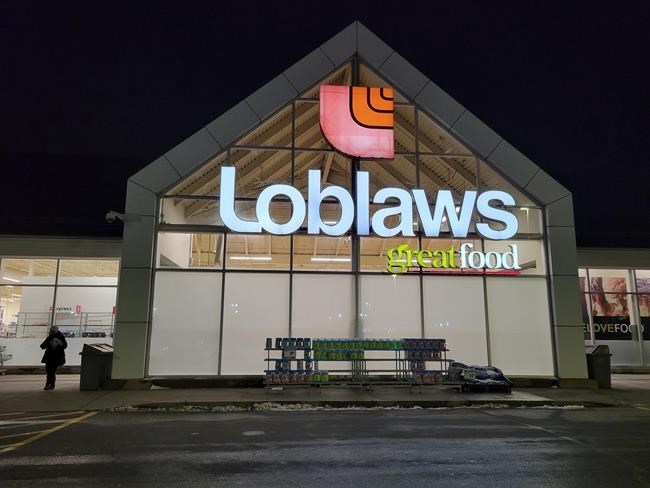A boycott targeting Loblaw is gaining momentum online, with what could be thousands of shoppers taking their money elsewhere in May.
It’s the latest sign of Canadians’ mounting frustration with the major grocers, which have been under political and public scrutiny for rising food prices and profits.
“We don’t want to struggle anymore,” said Emily Johnson, a mental health and addictions worker in Milton, Ont., and one of the boycott’s organizers.
Johnson and others started organizing the boycott after a Reddit group she created gained thousands of followers looking for a place to complain about Loblaw and other grocers.
The page, r/loblawsisoutofcontrol, now has about 56,000 members. While there’s no way of knowing how many will participate in the boycott, the page is full of posts from people who say they plan to, or have already started. There's also a list of demands to Loblaw from the boycott organizers that includes signing a grocery code of conduct and committing to affordable pricing.
The primary aim is to have a financial impact on Loblaw, Johnson said, the biggest of the Canadian grocers. But she also hopes the boycott educates people and gets the attention of government.
Mississauga resident and community advocate Rahul Mehta was already trying to cut back on shopping at Loblaw-owned stores, and plans to fully boycott the company come May.
He hopes the boycott drives shoppers not to other large grocers, but to local, independent stores.
“I think we could potentially see a resurgence in ... interest in learning and demanding real choices, not just Metro versus Loblaws,” he said.
Consumers increasingly feel powerless about the lack of choice they have, especially in smaller communities, said Monica LaBarge, an assistant professor at Queen’s University studying food access and consumer well-being.
“It’s unlikely that Loblaws is going to change ... its fundamental business model as a consequence of a boycott,” said LaBarge.
But that doesn’t mean the company isn't taking notice, she added, saying the grocer recently walked back a controversial change to its discounts on products nearing their best-before date after public outcry.
Loblaw president and CEO Per Bank says the company is paying attention to customers and sees them trying to mitigate inflation by seeking out sales, buying more private-label products and shopping at discount stores.
The grocer is responding to these shifting behaviours through new promotions and expanding its discount footprint, he said in an interview.
Loblaw has to keep looking for ways to provide value to keep people coming back, he said: “We don’t have a contract with our customers. They can choose to shop elsewhere tomorrow, if they don't like the offer that we're giving.”
Bank says he takes customer complaints personally, and if customers aren’t happy, “that’s something I want to fix.” He added that if one customer really dislikes Loblaw, “that’s one too many.”
The boycott’s effect on the company might not be immediate, but could build up over time if people’s habits change, said LaBarge.
“That's where the financial impact is,” she said. “It's that consistent loss of consumers over time, because they’re very hard to get back once they're gone.”
LaBarge said she thinks the grocers don’t fully understand “how deeply unhappy their customers are,” and the risk that poses to their reputations.
Some boycott participants were once loyal Loblaw customers, like Willi Fleerakkers, who plans to forgo not only Loblaw, but also Metro and Empire stores in May.
“I've already switched (to) getting my vegetables and fruit from my local family store,” Fleerakkers said.
She isn’t sure the boycott will significantly hit Loblaw’s bottom line, but thinks it could affect their reputation.
For Ann de Sequeira, the boycott has already begun.
The impetus was Loblaw’s move to reduce its discount level on food nearing its expiry date, she said.
De Sequeira, a Torontonian who posts about food on TikTok, said she’s doing a “soft" boycott of the other two big Canadian grocers but has pretty much entirely cut Loblaw out of her life, cancelling her PC Financial Mastercard and moving her prescriptions from Shoppers Drug Mart.
Loblaw walking back its discount change showed de Sequeira that if consumers “make a stink about something that's loud enough, they have to take action,” she said.
Bank acknowledged that Loblaw’s reputation has taken a hit since pre-pandemic times, and said it’s something the company is looking to rebuild.
He argued it’s easier for customers to “point fingers” at grocers like Loblaw than at other players in the supply chain or global factors leading to higher prices.
“Everybody knows Loblaws. Everybody knows our chairman (Galen Weston),” he said.
“We are (a) much, much easier target, and we need to live with that and that’s fine.”
Some people are unsure about the boycott -- some aren’t sure it will work, while for others, boycotting Loblaw-owned stores is easier said than done.
Both are the case for Halifax resident Tempa Hull. The two closest grocery stores to Hull are a Loblaws and a Sobeys, and she doesn’t have a car. But she knows others have even less choice.
“Most people don't have the choice, time or money to do this,” she said.
She and her husband are going to try to participate, at least partially. Though they can't buy everything they need elsewhere, they plan to reduce their shopping at Loblaws.
“What I think this planned boycott is ultimately going to demonstrate is that they have us by the throat. That we're unable to boycott them because they simply own too many things that we need in order to live and function in society,” said Hull.
“And that right there, if anything, should be the big red flag to government that they need to get serious about fixing the problem.”
This report by The Canadian Press was first published April 29, 2024.
Companies in this story: (TSX:L)
Rosa Saba, The Canadian Press



